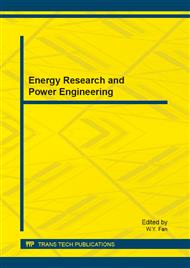[1]
Gao Jianping, Zhu G M G, Strangas E G, et al, Equivalent Fuel Consumption Optimal Control of a Series Hybrid Electric Vehicle [J]. Journal of Automobile Engineering, 2009, 223(8): 1003-1018.
DOI: 10.1243/09544070jauto1074
Google Scholar
[2]
M. Ehsan, Y. Gao, and A. Emadi, Modern Electric, Hybrid Electric and Fuel Cell Vehicles: Fundamentals, Theory, and Design, 2nd ed . New York: Taylor &Francis, (2010).
DOI: 10.1201/9781420054002
Google Scholar
[3]
Yue Shubiao, Gao Jianping, Yang Luhang, Start/Stop Control Strategy for Parallel Hybrid Electric Vehicle ,[J] Journal of Henan University of Science &Technology(Natural Science) 2011, 32(2):21-26.
Google Scholar
[4]
Piccolo A, Ippolito L, Galdi V, Optimization of energy flow management in Hybrid Electric Vehicles via Genetic Algorithms[C] / Conferentce on Advanced Intelligent Mechatronics. Como: IEEE/ASME Int , (2001).
DOI: 10.1109/aim.2001.936493
Google Scholar
[5]
Huang B, Wang Z, Xu Y. Multi-objective genetic algorithm for hybrid electric vehicle parameter optimization [C]/Proceeding IEEE International Conferrence on Intelligent Robots and Systems, Washington: IEEE, 2006: 5177 – 5182.
DOI: 10.1109/iros.2006.281654
Google Scholar
[6]
S.M. MeMi Ansarey M, Mohsen Mohammadian and S.M. Taghi Bathaee, Power Flow Distribution For Hybrid Fuel Cell Vehicle Via Genetic Algorithm Method, SAE. 2004_0 1-3040A. Sakai. Y Sasaki A. Otomo E Kawahata A, Matui. Toyota Braking System for Hybrid Vehicle with Regenerative System.
DOI: 10.4271/2004-01-3040
Google Scholar
[7]
HASANZADEH A, ASAEI B, EMADI A. Optimum design of series hybrid electric buses by genetic algorithm [C]/IEEE ISIE, Dubrovnik, Croatia, (2005).
DOI: 10.1109/isie.2005.1529148
Google Scholar
[8]
SCHOEGGL P, KRIEGLER W. Virtual optimization of vehicle and powertrain parameters with consideration of human factors[R]. SAE Paper 2005-01-(1945).
DOI: 10.4271/2005-01-1945
Google Scholar
[9]
Zhang Xin, Song Jianfeng, Tian Yi, Multi—objective Optimization of Hybrid Electric Vehicle Control Strategy with Genetic Algorithm [J]. Journal of Mechanical Engineering,2009, 45(2).
DOI: 10.3901/jme.2009.02.036
Google Scholar
[10]
Seo, Janghoo; Ooka, Ryozo; Kayo, Genku , Study on optimal energy system design for apartment house using genetic algorithms [C]/International Building Performance Simulation Association 2009 , 11th International IBPSA Conference pp.1830-1834, (2009).
Google Scholar
[11]
Liu Guoqing, Chen Jie, Na Tianming, NLPQL of control rules for improving fuel economy of a parallel hydraulic hybrid bus, International Journal of Modelling, Identification and Control, v 7, n 4, pp.315-320, (2009).
DOI: 10.1504/ijmic.2009.027882
Google Scholar


